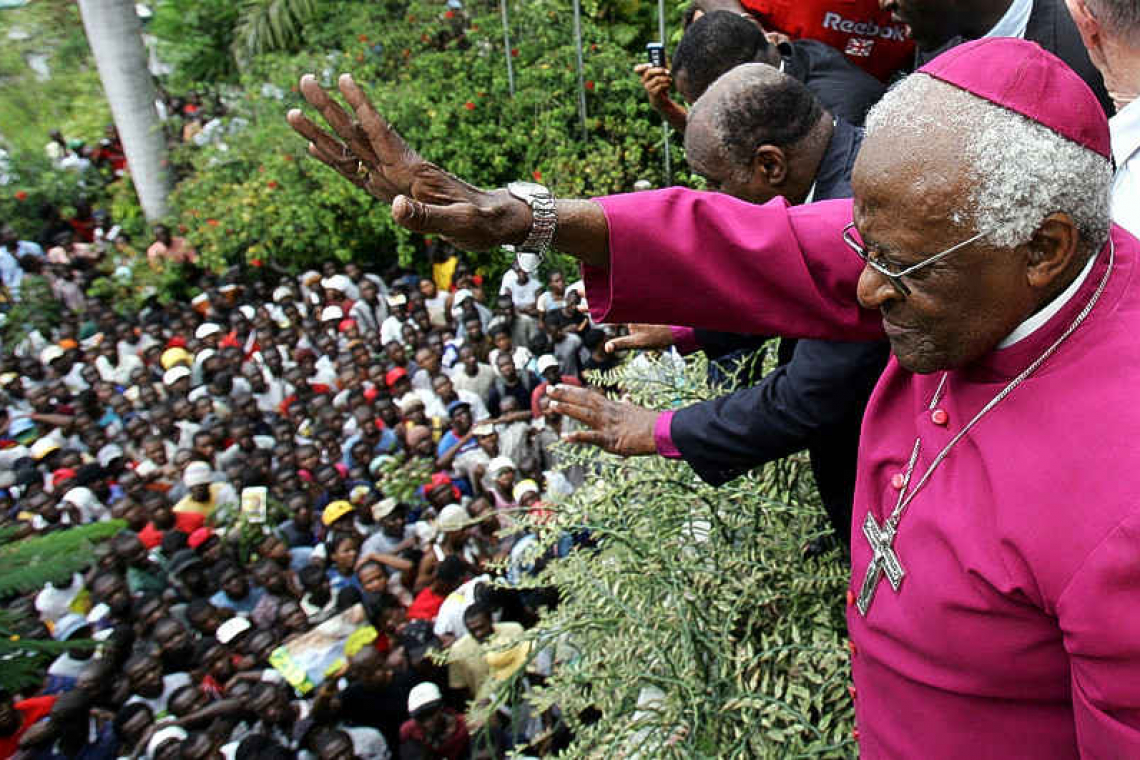South African Nobel Peace Prize laureate Desmond Tutu tries to calm thousand of supporters of Haitian presidential candidate Rene Preval, as they try to get into the Montana Hotel, where the Provisional Electoral Center cancelled a press conference to announce polling results yesterday, in Port-au-Prince, February 13, 2006. REUTERS/Carlos Barria/File Photo
By Nqobile Dludla and James Macharia
JOHANNESBURG, Dec 26 (Reuters) - Archbishop Desmond Tutu, Nobel Peace Prize laureate and veteran of South Africa's struggle against white minority rule died on Sunday at the age of 90, the presidency said.
In 1984 Tutu won the Nobel Peace Prize for his non-violent opposition to apartheid. A decade later, he witnessed the ends of that regime and he chaired a Truth and Reconciliation Commission, set up to unearth atrocities committed during those dark days.
The outspoken Tutu was considered the nation's conscience by both Black and white, an enduring testament to his faith and spirit of reconciliation in a divided nation.
He was diagnosed with prostate cancer in the late 1990s and in recent years was hospitalised on several occasions to treat infections associated with his cancer treatment.
"The passing of Archbishop Emeritus Desmond Tutu is another chapter of bereavement in our nation’s farewell to a generation of outstanding South Africans who have bequeathed us a liberated South Africa," President Cyril Ramaphosa said. "Desmond Tutu was a patriot without equal."
The presidency gave no details on the cause of death.
Summary
Tutu won Nobel for non-violent opposition to apartheid
Tutu considered nation's conscience by both Black and white
Anti-apartheid hero fought for "Rainbow Nation"
State gives no details on the cause of death
Tutu diagnosed with cancer in 1990s
Tutu preached against the tyranny of the white minority but even after its end never wavered in his fight for a fairer South Africa, calling the Black political elite to account with as much feistiness as he had the white Afrikaners. In his final years, he regretted that his dream of a "Rainbow Nation" had yet to come true.
"Ultimately, at the age of 90, he died peacefully at the Oasis Frail Care Centre in Cape Town this morning," Dr Ramphela Mamphele, acting chairperson of the Archbishop Desmond Tutu IP Trust and Co-ordinator of the Office of the Archbishop, said in a statement on behalf of the Tutu family. A frail-looking Tutu was seen in October being wheeled into his former parish at St George's Cathedral in Cape Town, which used to be a safe haven for anti-apartheid activists, for a special thanksgiving service marking his 90th birthday.
Dubbed "the moral compass of the nation", his courage in defending social justice, even at great cost to himself, always shone through - and not just during apartheid. He often fell out with his erstwhile allies at the ruling African National Congress party over their failures to address the poverty and inequalities that they promised to eradicate.
Just five feet five inches (1.68 metres) tall and with an infectious giggle, Tutu helped rouse grassroots campaigns around the world that fought for an end to apartheid through economic and cultural boycotts.
Talking and travelling tirelessly throughout the 1980s, he became the face of the anti-apartheid movement abroad while many of the leaders of the rebel ANC, such as Nelson Mandela, were behind bars.
PEOPLE'S CATHEDRAL
Tributes poured in from around the world.
The Archbishop of Canterbury Justin Welby hailed Tutu on Twitter, saying he "was a prophet and priest, a man of words and action" while flamboyant British billionaire Richard Branson said in a blog post: The world has lost a giant. He was a brave leader, a mischievous delight, a profound thinker, and a dear friend."
Tutu led numerous marches and campaigns to end apartheid from St George's front steps, which became known as the "People's Cathedral" and a powerful symbol of democracy.
He was a long-time friend of Mandela, and the pair lived for a time on the same street in the South African township of Soweto, making Vilakazi Street the only one in the world to host two Nobel Peace Prize winners.
"His most characteristic quality is his readiness to take unpopular positions without fear," Mandela once said of Tutu. "Such independence of mind is vital to a thriving democracy."
At a Boxing Day service at St George’s, there were only a handful of congregants to hear the news of Tutu's death in a brief homage by the Very Reverend Michael Weeder, who spoke from the Archbishop's former pulpit, saying it was “once the celebrated point of command” before asking parishioners to bow their heads in a moment of silence.
"It is sad, but he was old and served his country very well and it's a very painful loss at a time when there is a leadership crisis in the country and the world,” said Ntokozo Mjiyako, a 39-year-old lawyer taking an early morning stroll in Cape Town.
Additional reporting by Wendell Roelf; Writing by James Macharia Chege; Editing by Robert Birsel, Kirsten Donovan.







